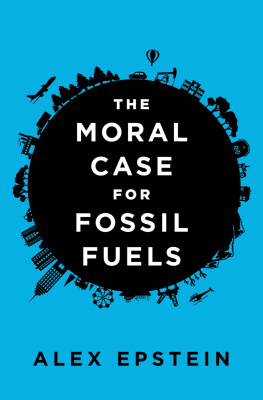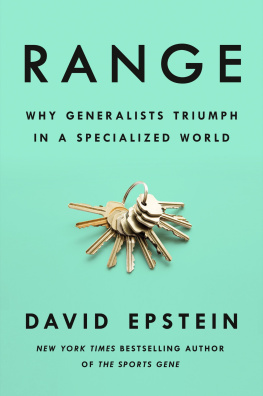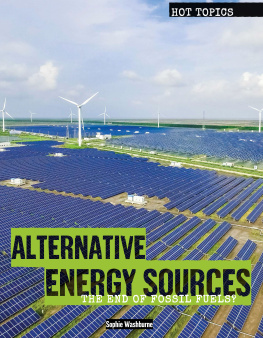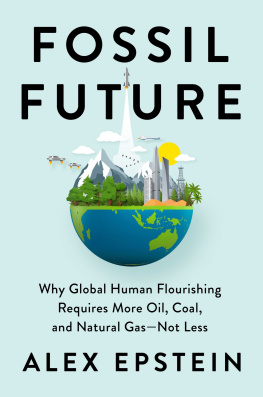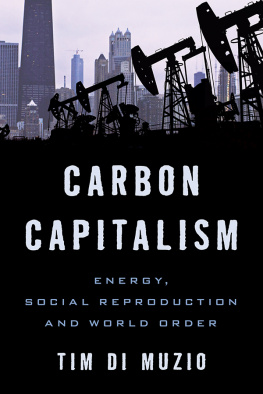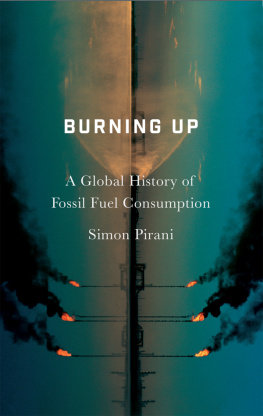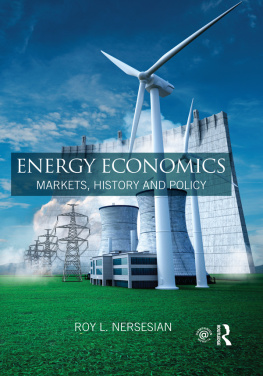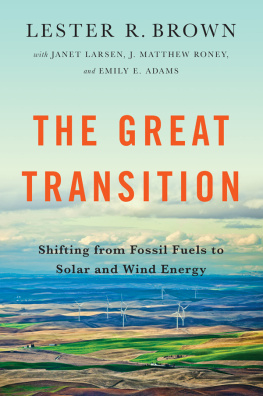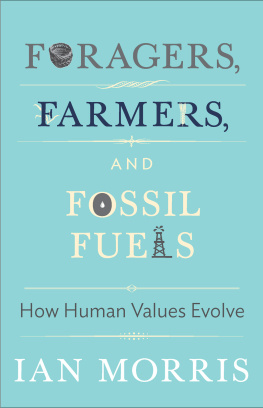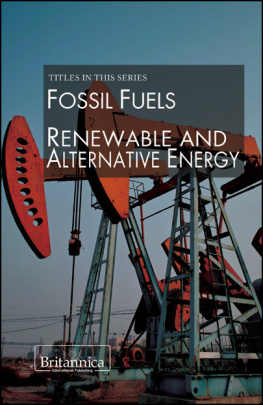USA | Canada | UK | Ireland | Australia | New Zealand | India | South Africa | China
First published by Portfolio / Penguin, a member of Penguin Group (USA) LLC, 2014
Copyright 2014 by Alexander J. Epstein
Penguin supports copyright. Copyright fuels creativity, encourages diverse voices, promotes free speech, and creates a vibrant culture. Thank you for buying an authorized edition of this book and for complying with copyright laws by not reproducing, scanning, or distributing any part of it in any form without permission. You are supporting writers and allowing Penguin to continue to publish books for every reader.
Image on page : Craig D. Idso, Center for the Study of Carbon Dioxide and Global Change.
While the author has made every effort to provide accurate telephone numbers, Internet addresses, and other contact information at the time of publication, neither the publisher nor the author assumes any responsibility for errors, or for changes that occur after publication. Further, publisher does not have any control over and does not assume any responsibility for author or third-party Web sites or their content.
THE SECRET HISTORY OF FOSSIL FUELS
YOU MUST MAKE A LOT OF MONEY
Youre an environmentalist, right? the girl, college age, asked me. It was 2009, in Irvine, California. I had stopped at a farmers market near my office for lunch, and she was manning a Greenpeace booth right next to it.
Do you want to help us end our addiction to dirty fossil fuels and use clean, renewable energy instead?
Actually, I replied, I study energy for a livingand I think its good that we use a lot of fossil fuels. I think the world would be a much better place if people used a lot more.
I was curious to see how she would respondI doubted she had ever met anyone who believed we should use more fossil fuels. I was hoping that she would bring up one of the popular arguments for dramatically reducing fossil fuel use, and I could share with her why I thought the benefits of using fossil fuels far outweighed the risks.
But fossil fuels cause climate change, she might have said. I agree, I would have replied, but I think the evidence shows that climate change, natural or man-made, is more manageable than ever, because human beings are so good at adapting, using ingenuity and technology.
But fossil fuels cause pollution, she might have said. I agree, I would have replied, but I think the evidence shows that ingenuity and technology make pollution a smaller problem every year.
But fossil fuels are nonrenewable, she might have said. I agree, I would have replied, but I think the evidence shows that there are huge amounts of fossil fuels left, and well have plenty of time to use ingenuity and technology to find something cheapersuch as some form of advanced nuclear power.
But fossil fuels are replaceable by solar and wind, she might have said. I disagree, I would have replied, because the sun and the wind are intermittent, unreliable fuels that always need backup from a reliable source of energyusually fossil fuels, which is the only source of energy that has been able to provide cheap, plentiful, reliable energy for the billions of people whose lives depend on it.
But she didnt say any of those things. Instead, when I said I thought that we should use more fossil fuels, she looked at me with wide-eyed disbelief and said, Wow, you must make a lot of money.
In other words, the only conceivable reason I would say that our use of fossil fuels is a good thing is if I had been paid off by the fossil fuel industry.
Even though this wasnt true, I understood why she thought it. It is conventional wisdom that our use of fossil fuels is an addictiona short-range, unsustainable, destructive habit.
Eighty-seven percent of the energy mankind uses every second, including most of the energy I am using as I write this, comes from burning one of the fossil fuels: coal, oil, or natural gas. Without exception, anyone who lives a modern life is directly or indirectly using large amounts of fossil fuel energyit is that ubiquitous.
But, we are told, this cannot continue.
While it might be convenient to drive gasoline cars and get electricity from coal in the short run, and while we might have needed them in the past, the argument goes, in the long run we are making our climate unlivable, destroying our environment, and depleting our resources. We must and can replace fossil fuels with renewable, green, climate-friendly energy from solar, wind, and biomass (plants).
This is not a liberal view or a conservative view; its a view that almost everyone holds in one form or another. Even fossil fuel companies make statements like the one the former CEO of Shell made in 2013: We believe climate change is real and time is running out to take real action to reduce greenhouse gas emissions. The debate over our addiction to fossil fuels is usually over how dangerous the addiction is and how quickly we can get rid of itnot whether we have one.
And the most prominent groups say we must get rid of it very quickly.
For years, the Nobel Prizewinning Intergovernmental Panel on Climate Change (IPCC) has demanded that the United States and other industrialized countries cut carbon dioxide emissions to 20 percent of 1990 levels by 2050and the United States has joined hundreds of other countries in agreeing to this goal.
Every day, we hear of new predictions from prestigious experts reinforcing the calls for massive restrictions on fossil fuel use. As I write this, news about melting ice in West Antarctica is leading to dire predictions of sea level rises: Scientists Warn of Rising Oceans from Polar Melt, reports the New York Times; Is It Too Late to Save Our Cities from Sea-Level Rise? asks Newsweek, citing new research that Miami and Manhattan will drown sooner than we thought.
The message is clear: Our use of fossil fuels is going to destroy us in the long run, and we should focus our efforts on dramatically reducing it as soon as humanly possible.
So when the girl at the Greenpeace booth implied that I had sold my soul, I didnt get offended. I simply explained that, no, I wasnt being paid off; I had just concluded, based on my research, that the short- and long-term benefits of using fossil fuels actually far, far outweigh the risks and was happy to explain why. But she wasnt interested. Pointing me to the Greenpeace pamphlets giving all the reasons fossil fuels are bad, she said, So many experts predict that using fossil fuels is going to lead to catastrophewhy should I listen to you? She made it clear that this wasnt a real question and that the conversation was over.
But if she had wanted an answer, I would have told her this: I understand that a lot of smart people are predicting catastrophic consequences from using fossil fuels, I take that very seriously, and I have studied their predictions extensively.
And what I have found is this: leading experts and the media have been making the exact same predictions for more than thirty years. As far back as the 1970s they predicted that if we did not dramatically reduce fossil fuel use

